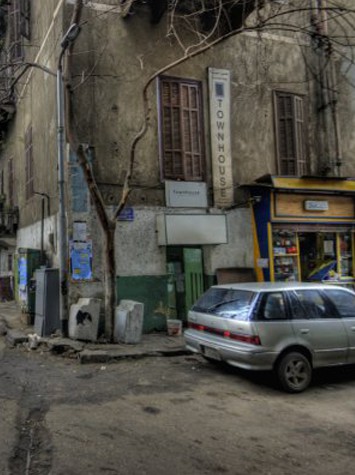15 years of embracing women in art
Fifteen years ago, Townhouse opened its doors as the first independent art space in Egypt with a remit to make contemporary arts accessible to all without compromising creative practice. Ever since, female artists as well as women working in Townhouse have played a more than eminent role in its development.
In a world where everyone is searching for a way to express themselves, art remains a convenient medium for all those who can’t find words to express their ideas or those who can’t find themselves in the virtual spaces of online media. Through its practices, a multitude of women within the art world have taken part in a dynamic relation with the gallery, resulting into successful collaborations, exhibitions and artworks.
The space, located in a car mechanic’s district in downtown Cairo, has exhibited work of young emerging artists as well as internationally recognized artists. Since opening in 1998, Townhouse was never a traditional gallery, it has pursued making art accessible not just by curating exhibitions, but also through running strong outreach programs. Most notable among those is SAWA (together), a program that serves more than 800 people annually, mainly refugees, with free art workshops. Townhouse also runs Rawabet, a theatre that gives young emerging performing artists an opportunity to experiment or even have their first-time shows; the Rooftop Studios, a local residency program for Egyptian artists in need of affordable workspaces; and an international residency program, one of the strongest such programs in the region.
None of these activities would have existed without a number of women who worked for Townhouse and its artists. As pointed out by William Wells, the gallery’s founder and director, the role women have played in Townhouse’s success over the past fifteen years is rather remarkable. “All our curators, program managers and most of our managerial positions were filled by women since we opened our doors. We had some men work for us in other jobs, but it was mostly women who made a lot of difference in the gallery”, Wells says.
“The idea of Al Nitaq Festival, a multidisciplinary contemporary art festival that took place in the streets of Downtown Cairo in 2000/2001 evolved in discussions where our Assistant curator then, Mai Abou Eldahab, were a part of” Wells continues. The festival was cooperation between Townhouse and other commercial galleries in downtown. Over 100 visual artists were selected by three private gallery curators to exhibit in the galleries, rented spaces, restaurants and other venues hosting the festival. “Many of these artists, after losing the umbrella support of the government’s patronage, began to be labeled as independent artists. But these artists have no shared vision or position, and instead are only united by their reactionary relationship to public institutions”, Mai Abou Eldahab said in an interview about young artists back then.
Townhouse, as a space with regional and international relationships, has provided its staff and artists with exposure and career opportunities. Among Townhouse’s past employees, who have moved forward with their careers is Sarah Rifky, a curator who co-founded MASS in Alexandria, in addition to co-founding another independent art space ‘Beirut in Cairo’.
Other examples of women whose careers launched off at Townhouse are: Dalia Soliman (Director of the Contemporary Image Collective), Dina Ramadan (a writer and assistant professor in Bard college) and Negar Azimi (editor of Bidoun Magazine, one of the most important publications on art and culture in the region).
In addition to female staff, female artists also had participation in Townhouse’s history. The gallery has exhibited far more female than male artists. Shortly after its founding, in March 1999, the gallery celebrated the “Month of Women” by curating an exhibition entitled “Four Women,” featuring Huda Lutfi, Lara Baladi, Sabah Naim and Dina El Gharib, officially celebrating and acknowledging the by now already prominent female presence within the institution.
Huda Lutfi, an art historian, activist and visual artist who has decided to move into Townhouse’s neighborhood in 1997 in order to be in the heart of busy Cairo that influences her work. She has had a number of exhibitions in Townhouse since it was founded. Huda’s works include paintings and collages raising questions about women, democracy and other controversies. In 2003, Townhouse featured Huda’s series, “Found in Cairo”. The work deliberately contests rigid notions of identity by including images or photos of faces which are not strictly defined as ‘Egyptian’, but which have been found in the city’s old book stalls and antique shops. Thus Um Kulthum (Egypt’s foremost singer), Tahiyya Karyokka (Egypt’s foremost dancer), the Mona Lisa, Frida Kahlo, and Marilyn Monroe become integral faces in an imagined city surroundings.
“I used the black and white series of recycled photos, in which the female body is shown in various gestures, to expose the cultural obsession with the feminine self-image, to cover her body or not to cover it. As if to get away from the noise and distracting images and colors of Cairo, and just as many Cairenes do in their nightly Sufi gatherings, a large part of the exhibit focuses on the meditative”, Huda Lutfi tells.
Townhouse has also shown work by Lara Baladi, an Egyptian-Lebanese visual artist, co-founder of Radio Tahrir and Cinema Tahrir and also a member of the Arab Image Foundation. Lara’s work exhibited in Townhouse included “Al Fanous Al Sehry” in 2003;an 8 pointed star of light-boxes containing saturated color images produced from x ray photographs of a pregnant doll. The entire installation consisted of 30 meters running images with a diameter of approximately 7 meters. Baladi also exhibited “The Wheel of Fortune” in 2006, a life-sized kaleidoscope.
After fifteen years of women participation in Townhouse, the gallery starts a new season this September during which it will celebrate its fifteenth anniversary. To follow Townhouse’s updates and news visit www.thetownhousegallery.comand subscribe to their newsletter or follow them @townhouse_Cairo.

